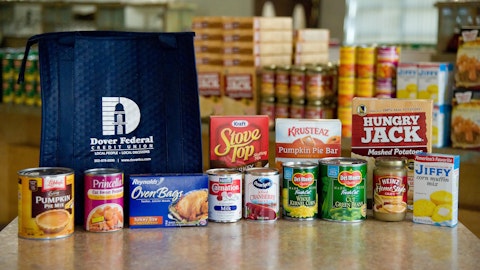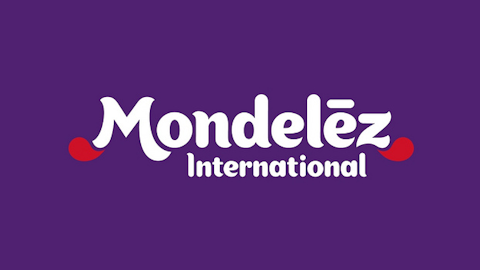Food stocks have been a staple of investors’ portfolios for decades and have rewarded them with fat returns throughout that time. However, the food companies behind those returns have also made non-investors fat, though not financially, thanks to their sugar-laden, nutrition-deprived offerings. That’s led to a concerted effort among consumers to eat healthier in an effort to trim their waistlines, and the Big Food companies are also feeling the pinch.
The tide has clearly turned against processed food and that’s being reflected in sluggish top- and bottom-line growth at most of the big food companies, including General Mills, Inc. (NYSE:GIS), Mondelez International Inc. (NASDAQ:MDLZ), Kellogg Company (NYSE:K), Kraft Heinz Co (NASDAQ:KHC), and Conagra Brands, Inc. (NYSE:CAG).
At Kellogg Company (NYSE:K), annual revenue has fallen in each of the last four years, declining by nearly $2 billion between 2013 and 2017. Conagra Brands, Inc. (NYSE:CAG) has fared even worse, with revenue plummeting by nearly 50% during the same period. Mondelez International Inc. (NASDAQ:MDLZ)’s annual sales have also taken a beating, shedding nearly $10 billion between 2013 and 2017.
Popular Brands Losing Favor With Consumers: Brands that have long been staples of the American diet have not been spared from consumers’ heightened snubbing of processed foods. Sales of General Mills, Inc. (NYSE:GIS)’s Hamburger Helper fell by 14% in 2012 as Americans increasingly give up ground beef for leaner and (somewhat) healthier meats like chicken and fish. General Mills’ Yoplait yogurt brand endured a sales slump of 11% in 2016 as consumers slurp back increasing quantities of healthier Greek yogurt in its place.
Follow General Mills Inc (NYSE:GIS)
Follow General Mills Inc (NYSE:GIS)
Receive real-time insider trading and news alerts
Even Kraft Heinz Co (NASDAQ:KHC)’s iconic Macaroni and Cheese dinners have been losing market share to healthier alternatives like Annie’s organic macaroni/shells and cheese in recent years.
Why Big Food Companies Can’t (And Won’t) Make Healthy Food: The solution seems simple enough; General Mills, Inc. (NYSE:GIS), Mondelez International Inc. (NASDAQ:MDLZ), Kellogg Company (NYSE:K), and the other major food companies need only release healthier alternatives of their own.
There are two chief problems standing in the way of that halcyon dream. Firstly, less processed foods cost more money to make and thus have lower margins. Food companies are already struggling under the weight of rising transportation costs, which hit 20-year highs in February, prompting General Mills, Inc. (NYSE:GIS) to raise prices on some of its products and slash its 2018 earnings estimates.
Secondly, foods that aren’t as highly processed retain more of their nutritional value, which makes them more filling to consumers and limits the likelihood that they’ll overindulge on those foods. This of course is bad for the food companies, which want to sell you as much nutritionally-starved foods as they can so you’ll eat more and buy more.
Not Even Consolidation Can Save Swooning Growth: The big food companies have made some token gestures on the healthy food front, often thanks to their gluttonous appetite for purchasing smaller food companies that find success. Examples include Mondelez International Inc. (NASDAQ:MDLZ)’s 2015 purchase of Enjoy Life Foods, and General Mills, Inc. (NYSE:GIS) acquiring the aforementioned Annie’s in 2014.
These acquisitions serve the dual purpose of allowing them to instantly add trending health brands to their portfolios, making them look health-conscious, while preventing any real competition from brewing that could threaten their dominance over grocery aisles.
However, the reality is that these companies have no plans to ever make healthy food a prominent part of their portfolios. Healthy and processed simply don’t go well together, and processed food is what these companies have been built to make. So unless consumers suddenly decide they don’t care how fat and diabetic they’ve all become and go back to eating processed junk in greater quantities, there’s little hope that the big food companies will see any meaningful return to growth any time soon.
Hedge Funds Souring on Food Stocks: When looking at hedge fund ownership data, it’s clear to see that hedge funds are ditching the shares of big food companies for more promising investments. Among the funds in our database, 53 owned shares of Mondelez International Inc. (NASDAQ:MDLZ) at the end of 2017, down from 57 just three months earlier. Ownership of Kraft Heinz Co (NASDAQ:KHC) fell to 42 from 54 during the same period, Conagra Brands, Inc. (NYSE:CAG) fell to 33 from 39, and Kellogg Company (NYSE:K) slid to 18 from 24.
A better option for investors hungry for a heaping helping of healthy returns is Insider Monkey’s flagship “Best Performing Hedge Funds Strategy”, which invests in the consensus picks of the top 100 best performing hedge funds every quarter. This strategy gained 4% last quarter vs. a loss of 1% for the S&P 500 ETF (SPY) and double-digit losses for many of the largest packaged foods companies. Since its inception in May 2014 this strategy’s picks have returned 74.4% vs. 49.7% for the SPY. You can see our latest picks by trying our newsletters free of charge for 14 days.
Disclosure: None






